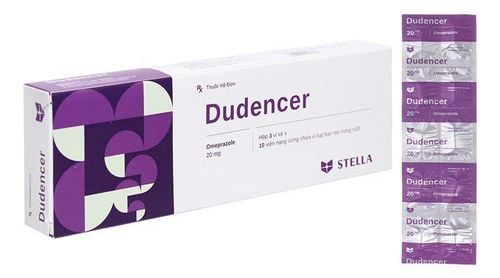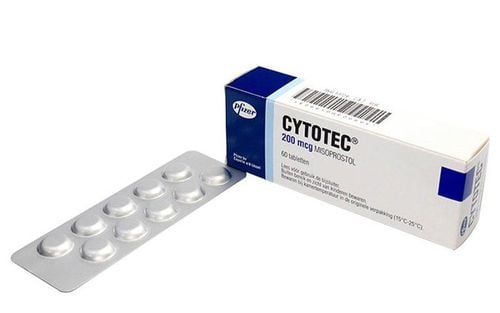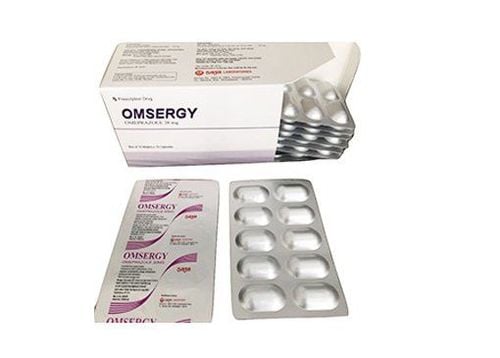This is an automatically translated article.
Alzole is used to treat the symptoms of gastroesophageal reflux disease (GERD) and other conditions related to too much stomach acid. It needs to be taken in the morning and it can take up to 4 days for you to feel the full effect.
1. What is Alzole?
Alzole contains Omeprazole, a prescription medicine that is only available in generic form. Omeprazole is also available as an oral suspension and over-the-counter (OTC).
Prescription Alzole oral capsule is a slow release medicine. Slow-release drugs slow the release of the medicine until it passes through your stomach. This delay prevents the drug from being inactivated in your stomach.
2. How Alzole . Works
Alzole is a proton pump inhibitor (PPI). It reduces the amount of acid in your stomach by blocking the final step of stomach acid production.
3. Uses of Alzole
Alzole drug is effective in the following diseases:
Stomach ulcers; duodenal ulcer (first part of the small intestine) with or without bacterial infection; Helicobacter pylori (H. pylori); Gastroesophageal reflux; Erosive esophagitis (esophagitis) caused by acid reflux; Other rare conditions that cause excessive gastric acid secretion (ie, Zollinger-Ellison syndrome); Heartburn .
4. Dosage for Alzole
Stomach ulcers: Take Alzole 40 mg once a day for 4 to 8 weeks; Duodenal ulcer: 20 mg orally once a day for 4 weeks. Some people may require an extra 4 weeks; Gastroesophageal reflux disease (GERD): Take 20 mg once daily for up to 4 weeks; Erosive esophagitis due to GERD: Take 20 mg once daily for 4 to 8 weeks. To maintain esophageal healing, take 20 mg once daily for up to 1 year; Eradicating H. pylori to reduce the risk of duodenal ulcer - triple therapy: Oral 20 mg, twice a day for 10 days in combination with Amoxicillin and Clarithromycin; Eradicating H. pylori to reduce the risk of duodenal ulcers - dual therapy: Oral omeprazole (Prilosec) 40 mg orally once daily for 14 days in combination with clarithromycin; Other rare conditions that cause excessive gastric acid secretion (i.e. Zollinger-Ellison syndrome): Start with 60 mg orally once daily. This dose may vary depending on your response to the medication; Sour (over-the-counter formulation): Take 20 mg once a day for 14 days; To use Alzole in children, check with your doctor to see what dose is right for your child.
5. Advantages and disadvantages of the drug Alzole
Pros:
Most people can take it without any noticeable daily side effects; Helps relieve pain longer than other drugs; Used for both adults and children; Available as over-the-counter and lower-cost generic options; The sachet form is a good option if you have trouble swallowing pills. Cons:
Not used for immediate relief of heartburn symptoms; It may take 1 to 4 days to fully start as it does not start working immediately; Usually should be taken on an empty stomach before meals for best results; Long-term use can weaken your bones and cause low levels of vitamin B12 and magnesium; May pass into breast milk.
6. Tips for taking Alzole
Over-the-counter Alzole (Prilosec) should only be used for frequent heartburn (2 or more days per week). It may take 1 to 4 days for you to see the full effect. Do not take the medicine for more than 14 days. If your symptoms do not improve after 14 days, tell your doctor;
Swallow Alzole capsules whole, do not chew or crush the medicine. If you have trouble swallowing, the Alzole capsule can be opened and sprinkled with 1 tablespoon of apple sauce. This mixture should be swallowed immediately and not chewed.
Antacids can be taken with Alzole for quick relief of heartburn symptoms.
Alzole may affect the way other medicines work and vice versa. So tell your doctor about all the medications you are taking, including prescription and nonprescription drugs, vitamins, or herbal supplements.
7. Alzole side effects
With any medicine there are risks and benefits. Even if the medication is working, you may still experience some unwanted side effects.
Contact your doctor immediately if you experience any of the following side effects:
Allergic reaction: Hives, difficulty breathing, swelling of the face, lips, tongue or throat; severe stomach pain, watery or bloody diarrhea; Kidney problems: Blood in the urine, rapid weight gain, urinating more or less than usual; Low magnesium: Irregular heartbeat, muscle cramps, tremors; New or worsening symptoms of lupus: Joint pain, a skin rash on your arm that gets worse in the sun.
8. Risks and Warnings for Alzole
Alzole can cause some serious health problems. This risk may be even higher for certain groups. If this worries you, talk to your doctor or pharmacist about other options.
Stomach cancer: Heartburn and an upset stomach can be a warning sign of a more serious stomach problem or cancer. If your symptoms don't go away after 2 weeks, get worse, or recur after completing a course of Alzole treatment, talk to your doctor; Kidney damage: Alzole can cause kidney damage, which can occur at any time during treatment. If you notice blood in your urine, change in the amount of urine, nausea, fever or confusion, stop taking Alzole and talk to your doctor right away; Severe diarrhea: Alzole may increase your risk of getting a bacterial infection that causes severe diarrhea. If you notice symptoms such as watery diarrhea, fever or stomach pain that don't go away, tell your doctor; Fractures: Alzole may increase your risk of breaking a bone, especially if you are on high doses or on long-term treatment. You may need vitamin D and calcium supplements while taking this medicine; Lupus: Alzole may cause you to develop or worsen symptoms of existing lupus. Symptoms of lupus can be different for everyone (such as joint pain or a rash), so talk to your doctor about what symptoms to look out for. Symptoms of lupus should improve within 4 to 12 weeks after stopping Alzole. Interactions with other medications: Alzole can interact with many medications, vitamins, and herbal supplements. Common medicines that should not be taken at the same time as Omeprazole (Prilosec) include Clopidogrel, Rifampin (Rifadin), and Methotrexate. Not all possible interactions are listed here. You should tell your doctor or pharmacist about all the medicines you are taking. Low levels of vitamin B12 and magnesium: Rarely, Alzole can cause low blood magnesium or vitamin B12 levels. This can happen with as little as 3 months of use, but is more common after you've used Alzole for 1 year or more. Signs of low magnesium include irregular heartbeat, muscle cramps, and tremors. Signs of low vitamin B12 include weakness, fatigue, "pins and needles" feeling in the hands and feet, dizziness, changes in balance or coordination, pale skin. If you notice any of these symptoms, let your doctor know. In summary, Alzole is used to treat the symptoms of gastroesophageal reflux disease and other condition related to too much stomach acid. Patients need to use the drug as prescribed by the doctor to ensure safety and promote treatment effectiveness.
Please dial HOTLINE for more information or register for an appointment HERE. Download MyVinmec app to make appointments faster and to manage your bookings easily.













